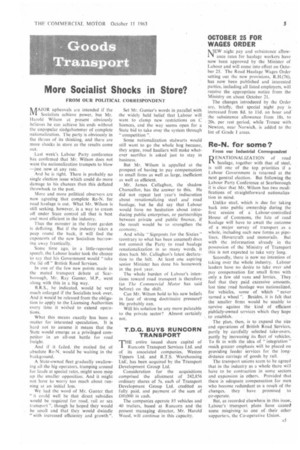More Socialist Shocks in Store?
Page 7

If you've noticed an error in this article please click here to report it so we can fix it.
FROM OUR POLITICAL CORRESPONDENT
MAJOR upheavals are intended if the Socialists achieve power, but Mr. Harold Wilson at present obviously believes he can achieve his ends without the unpopular sledgehammer of complete nationalization. The party is obviously in the throes of its thinking, and there are more shocks in store as the results come out.
Last week's Labour Party conference has confirmed that Mr. Wilson does not want the nationalization trumpets to blow —just now at any rate.
And he is right. There is probably no single election issue which could do more damage to his chances than this deflated throwback to the past.
More and more political observers are now agreeing that complete Re-N. for road haulage is out. What Mr. Wilson is still seeking, however, is a way to cream off under State control all that is best and most efficient in the industry.
Thus the monster in the front garden is deflating. But if the industry takes a peep round the back, it will find the exponents of the new Socialism burrowMe away frantically.
Some time ago, in a little-reported speech, the Labour leader took the chance to say that his Government would "take the lid off" British Road Services.
In one of the few new points made in the muted transport debate at Scarborough, Mr. Ray Gunter, M.P., went along with this in a big way.
[I.R.S., he indicated, would be very much enlarged if the Socialists took over. And it would be released from the obligation to apply to the Licensing Authorities every time it wished to extend operations.
What this means exactly has been a matter for interested speculation. it is hard not to assume it means that the State would emerge as a privileged competitor in an all-out battle for road freight.
And if it failed. the mailed fist of absolute Re-N, would be Waiting in the background.
A State-owned fleet gradually swallowing all the big operators, tramping around for loads at special rates, might soon mop up the smaller opposition. And it might not have to worry too much about running at an initial loss: We had the word of Mr. Gunter that " it could well be that direct subsidies would be required for "road, rail or sea transport ", though he hoped they would be small and that they would dwindle "with increased efficiency and growth ". Set Mr. Gunter's words in parallel with the widely held belief that Labour will want to clamp new restrictions on C licences, and the way seems open for a State bid to take over the system through " competition ".
Some nationalization stalwarts would still want to go the whole hog because, they argue, road hauliers will make whatever sacrifice is asked just to stay in business.
But Mr. Wilson is appalled at the prospect of having to pay compensation to small firms as well as large, inefficient as well as efficient.
Mr. lames Callaghan, the shadow Chancellor, has the answer to this. He did not repeat last year's indiscretion about renationalizing steel and road haulage, but he did say that Labour would have no hesitation about introducing public enterprises, or partnerships between private and public finance, if the result would be to strengthen the economy.
And while "Signposts for the Sixties" (contrary to what has been assumed) does not commit the Party to road haulage renationalization in so many words, it does back Mr. Callaghan's latest declaration to the hilt. At least one aspiring senior Minister has done his homework in the past year.
The whole burden of Labour's intentions toward road transport is therefore (as The Commercial Motor has said before) on the shift.
Can Mr. Wilson hold to his new beliefs in face of strong doctrinaire pressureV He probably can.
Will his solution be any more palatable to the private sector? Almost certainly not.




















































































































